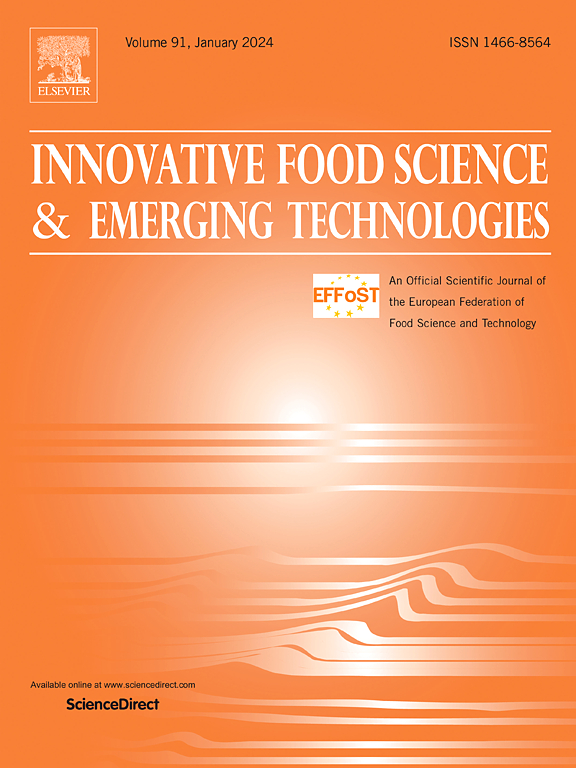Effect of probiotic fermentation on the extraction rate and bioactivity of plant-based polysaccharides: A review
IF 6.3
1区 农林科学
Q1 FOOD SCIENCE & TECHNOLOGY
Innovative Food Science & Emerging Technologies
Pub Date : 2024-11-04
DOI:10.1016/j.ifset.2024.103863
引用次数: 0
Abstract
Polysaccharides are biomacromolecules that make up the human body and have good physicochemical properties, bioactivities, and applications; these positive properties can be observed especially in polysaccharides from plants. However, the relatively low extraction rate and bioactivity of plant-based polysaccharides limit their application and popularization. Searching for a better extraction approach is important because of the disadvantages of high cost, environmental pollution, and narrow utilization range of physical, chemical, and enzymatic methods. This work conducted a review and found that probiotic fermentation effectively improved the extraction rate of plant-based polysaccharides in most cases. Meanwhile, probiotic fermentation significantly enhanced the bioactivities (including hypoglycemic, hypolipidemic, antioxidant, immunomodulatory, and probiotic activities) of plant-based polysaccharides. From a long-term perspective, probiotic fermentation might be a green and efficient strategy to improve the extraction rate and bioactivity of plant-based polysaccharides with great development potential, with probiotic-fermented dairy products and beverages being the best examples.
益生菌发酵对植物多糖提取率和生物活性的影响:综述
多糖是构成人体的生物大分子,具有良好的理化特性、生物活性和应用价值;这些积极特性在植物多糖中体现得尤为明显。然而,植物多糖相对较低的提取率和生物活性限制了其应用和推广。由于物理、化学和酶法存在成本高、环境污染、利用范围窄等缺点,寻找更好的提取方法显得尤为重要。本研究综述发现,在大多数情况下,益生菌发酵能有效提高植物多糖的提取率。同时,益生菌发酵显著提高了植物多糖的生物活性(包括降血糖、降血脂、抗氧化、免疫调节和益生菌活性)。从长远角度看,益生菌发酵可能是提高植物多糖提取率和生物活性的一种绿色、高效的策略,具有很大的发展潜力,益生菌发酵乳制品和饮料就是最好的例子。
本文章由计算机程序翻译,如有差异,请以英文原文为准。
求助全文
约1分钟内获得全文
求助全文
来源期刊
CiteScore
12.00
自引率
6.10%
发文量
259
审稿时长
25 days
期刊介绍:
Innovative Food Science and Emerging Technologies (IFSET) aims to provide the highest quality original contributions and few, mainly upon invitation, reviews on and highly innovative developments in food science and emerging food process technologies. The significance of the results either for the science community or for industrial R&D groups must be specified. Papers submitted must be of highest scientific quality and only those advancing current scientific knowledge and understanding or with technical relevance will be considered.

 求助内容:
求助内容: 应助结果提醒方式:
应助结果提醒方式:


